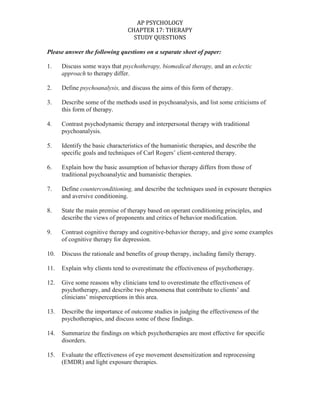
Chapter 17 study questions
- 1. Please answer the following questions on a separate sheet of paper:<br />1.Discuss some ways that psychotherapy, biomedical therapy, and an eclectic approach to therapy differ. <br />2.Define psychoanalysis, and discuss the aims of this form of therapy.<br />3.Describe some of the methods used in psychoanalysis, and list some criticisms of this form of therapy.<br />4.Contrast psychodynamic therapy and interpersonal therapy with traditional psychoanalysis.<br />5.Identify the basic characteristics of the humanistic therapies, and describe the specific goals and techniques of Carl Rogers’ client-centered therapy.<br />6.Explain how the basic assumption of behavior therapy differs from those of traditional psychoanalytic and humanistic therapies.<br />7.Define counterconditioning, and describe the techniques used in exposure therapies and aversive conditioning. <br />8.State the main premise of therapy based on operant conditioning principles, and describe the views of proponents and critics of behavior modification.<br />9.Contrast cognitive therapy and cognitive-behavior therapy, and give some examples of cognitive therapy for depression.<br />10.Discuss the rationale and benefits of group therapy, including family therapy.<br />11.Explain why clients tend to overestimate the effectiveness of psychotherapy.<br />12.Give some reasons why clinicians tend to overestimate the effectiveness of psychotherapy, and describe two phenomena that contribute to clients’ and clinicians’ misperceptions in this area.<br />13.Describe the importance of outcome studies in judging the effectiveness of the psychotherapies, and discuss some of these findings.<br />14.Summarize the findings on which psychotherapies are most effective for specific disorders.<br />15.Evaluate the effectiveness of eye movement desensitization and reprocessing (EMDR) and light exposure therapies.<br />16.Describe the three benefits attributed to all psychotherapies.<br />17.Discuss the role of values and cultural differences in the therapeutic process.<br />18.Define psychopharmacology, and explain how double-blind studies help researchers evaluate a drug’s effectiveness.<br />19.Describe the characteristics of antipsychotic drugs, and discuss their use in treating schizophrenia.<br />20.Describe the characteristics of antianxiety drugs.<br />21.Describe the characteristics of antidepressant drugs, and discuss their use in treating specific disorders.<br />22.Describe the use and effects of mood-stabilizing medications.<br />23.Describe the use of electroconvulsive therapy in treating severe depression, and discuss some possible alternatives to ECT.<br />24.Summarize the history of the psychosurgical procedure known as a lobotomy, and discuss the use of psychosurgery today.<br />25.Explain the rationale of preventive mental health programs.<br />
